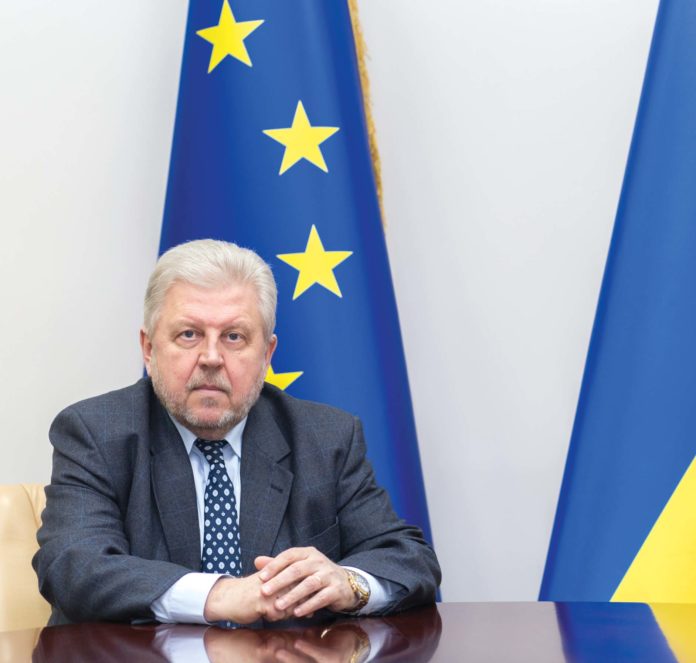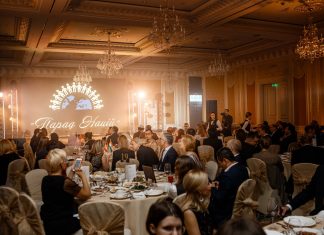Volodymyr Khandohiy, one of the most professional diplomats of independent Ukraine, spent the most part of his diplomatic career at the key positions in the representations of the Ukrainian SSR, the USSR, and Ukraine at the United Nations. He was the Extraordinary and Plenipotentiary Ambassador of Ukraine in Canada, in the Kingdom of Belgium, in the Grand Duchy of Luxembourg, in the Kingdom of the Netherlands, in the United Kingdom of Great Britain and Northern Ireland.
At the present time, Mr. Khandohiy is the Head of the Ukrainian Association of Foreign Policy. In an exclusive interview for FD he is telling about the current state of the Ukrainian diplomacy, its victories, its problems and prospects.
2017 became a year of not only a powerful foreign policy breakthrough, but also a year of the numerous challenges for the Ukrainian diplomacy. How adequately does our Foreign Ministry respond to these challenges?
— If to mean by a powerful foreign policy breakthrough the entry into force of the Ukraine-European Union Association Agreement and the obtaining of a visa-free regime with the EU countries, then yes. However, I would like to emphasize that this victory was not without a reason. It was not a miracle. The Ministry of Foreign Affairs of our state had been worked for almost ten years for this result. As for the challenges and the adequate response to them, I would not say everything is so good. And this is due to many unfavorable factors, which are both objective and subjective.
We have to communicate with many domestic diplomats who are no longer working at the Ministry of Foreign Affairs. Does the current headship of the Ministry of Foreign Affairs address you and your colleagues for the purpose of consulting?
— Unfortunately, no, it does not. Since 2014, we can state that many professional and experienced diplomats have been forced to leave the Ministry of Foreign Affairs. I would not now like to comment on staffing decisions of the current headship of the Ministry of Foreign Affairs, but so it is. I would not like to talk about everyone, but the current leadership of the Ministry of Foreign Affairs has not addressed and is not addressing me and many of my colleagues who have many years of experience in the diplomatic service. It is difficult for me to say why it is so. However, the Ukrainian Association of Foreign Policy, in the which office we are recording this interview now, was actually created by us, former senior officials of the Ministry of Foreign Affairs of Ukraine, to help and provide advice to the current headship – not only of the Ministry but also of the state. We hope our experience will be useful to Ukraine in this difficult time.
During the US presidential elections in 2017, our diplomacy underestimated Trump’s chances for victory. Great Britain supports us on the issue of territorial integrity, but still does not recognize the Holodomor as genocide of the Ukrainian people. In the matter of the status of Jerusalem, our representative in the UN has taken a neutral position, which caused a rather controversial reaction. What are such shortcomings connected with?
— Let’s be frank – there are shortcomings. In addition to Tramp’s victory, our diplomacy has also “overslept” the victory of Andrzej Duda in Poland. When he had almost won, there were still the notifications from our Embassy in Warsaw to Mykhailivska Square that his opponent was winning. As for Trump, it must be admitted that he did not really hope for the victory in these super complicated races. However, this should not serve as an excuse for our Embassy in the United States. They should have calculated all possible options and had a plan B, as it is customary in such cases. Unfortunately, our diplomats did not have anything like that. As for Britain’s failure to recognize the Holodomor-1933 as genocide, I must point out that the reason for this non-recognition lies not in the political but in the purely legal plane. British law defines genocide in accordance with an international convention that was adopted after the artificial famine in Ukraine, which was organized by the Stalinist regime. Therefore, lawyers do not consider it possible to apply its provisions retrospectively. But, again, I have to repeat myself – nevertheless the Embassy has to work. Lawyers and employees are somewhat specific people, but in any law, in any system you can find a field to promote the necessary things. However, they are not doing this. Why? Here, we are again approaching the HR policy of the Ministry of Foreign Affairs, which is a source of similar – as you have said – shortcomings. The same comes about the issue of the status of Jerusalem – to avoid voting – this is not a way out. Of course, it is not wise to quarrel either with the United States or with the whole Islamic world, but it could have been possible to abstain from voting, as some states of the European Union did.
What has Ukraine done and what has not, in your opinion, while presiding in the United Nations Security Council. Why?
— I would like to point out that the chairmanship in the Security Council does not give the state any preferences and does not open up special opportunities for advancement of its own position. We can rather talk about the two-year period of Ukraine’s stay in this most important UN body in terms of results. Unfortunately, there is nothing done more than done here. In my opinion, our work in this body could be more active and effective in the context of confronting Russian aggression in the Donbass and the eff orts to de-occupy the Crimea. Our diplomacy has not managed to increase the number of our supporters in the UN during the time of membership in the Security Council. So, we have the result – when a resolution on human rights violations in the Crimea was adopted in the General Assembly of the UN last year, then a little more than 70 member states out of 193 voted for it.
Are we fully using the UN and its mechanisms of influence to solve the problems of the occupied territories?
— No. Let’s talk frankly. The Minsk format is not effective. The OSCE does not fulfill its responsibilities as it should do. The proposal to send in the UN peacekeeping forces is appropriate, but why cannot we include the UN as one of the negotiating parties? This, of course, would have an impact on this negotiation as a positive factor. Unfortunately, this is not happening. And do not ask why. There is no substantiated answer to this question.
Constantly speaking about the problems of the occupied territories of the Donbass, doesn’t our diplomacy forget about Crimea, does it? Isn’t it worth to exacerbate this problem, first of all, through the UN?
— Of course, and this should be done much more insistently than we are doing now. Adoption of the resolution is good, but I do not see the consequences of direct work with the delegations of those countries that are either abstaining or voting against when we bring up the Crimean issue. In addition, there are many tools in the UN arsenal that can be called “soft means of pressure” on the country-aggressor. They need to be actively used. There are no trivialities in diplomacy.
2017 was declared the year of the centenary of Ukrainian diplomacy. Many Ukrainian historians are outraged, believing that Ukrainian diplomacy began during the Hetmanate, or even in Kyivan Rus. Do you support this point of view?
— If we consider the diplomatic service in the modern sense of this concept, then it can be really said about exactly one hundred years since the time of the UPR. Although we must remember about the deeper past. Of course, there was a diplomatic service in the Ukrainian SSR, which, despite all the phantom thing of this state formation, became the foundation upon which the diplomatic service of independent Ukraine grew up. In my book “Diplomatic Storylines: Nonfictional History of a Career Diplomat”, which has just been published in the Summit-Book Publishing House, I am writing about the diplomacy dating back to the Ukrainian SSR and the times of independent Ukraine. I hope that the difficult times will end, as we have something to rely on, and therefore we can move on…













